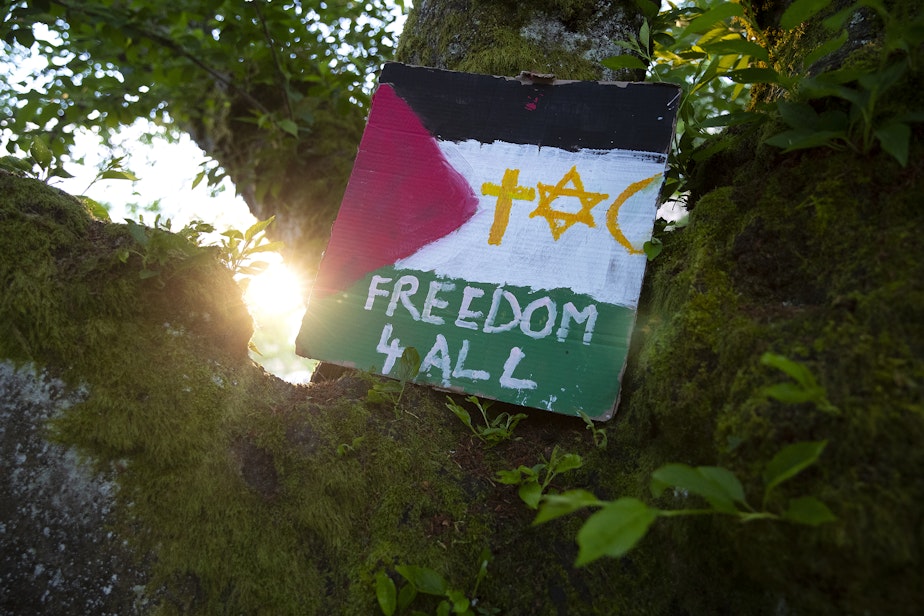UW officials, police unclear how many arrested pro-Palestinian protesters were students

Pro-Palestinian protesters could be facing charges of trespassing, property destruction, disorderly conduct, and conspiracy to commit all three after taking over the University of Washington Interdisciplinary Engineering Building Monday night.
At around 11 p.m., police entered the building and started arresting the demonstrators. UW Daily Managing Editor Sofia Schwarzwalder was there. She told KUOW’s Kim Malcolm about what she saw.
RELATED: Dozens of pro-Palestine demonstrators to appear in court after occupying UW building
This interview has been edited for clarity.
Kim Malcolm: Who led this protest last night and for how long?
Sofia Schwarzwalder: The protest started at 5 p.m. and ran until about 1 or 2 in the morning, when the final arrests were made. It was organized by a group called SUPER UW, which is a former UW student group that is currently suspended for their involvement in the encampment last year.
Sponsored
And what do we know about this group and what they wanted?
Yesterday's protest was focused on three demands, two of which were centered on Boeing. They're asking the university to cut all ties with Boeing, which is a long-standing demand. But this protest, specifically, was in the new Interdisciplinary Engineering Building that was partially funded by Boeing, and so, the protesters are looking for the university to cut Boeing out of the engineering department.
These protesters, were they University of Washington students, do they come from the outside?
Right now, it's unclear. It seems like it was a mix of students and outside people, but there hasn't been any identifying yet of what that distribution might be.
The group also put out a statement saying they were occupying the engineering building in part because of the 2023 Hamas terror attacks on Israeli citizens, which precipitated the invasion of Gaza. They described those 2023 attacks as a “heroic victory.” How are people responding to that?
Sponsored
University leaders have come out with statements today condemning the actions of the protesters and condemning, specifically, the language that they used to describe the October 7 attack.
Tell us more about what happened last night. Was it a peaceful occupation?
During the occupation, there were protesters inside and outside. Outside, it started with dinner provided by the organizers and speeches and chants. Eventually, they moved to block off the roads using bike racks, dumpsters, Lime bikes, and other objects. Ultimately, one of those blockades was set on fire, and the fire department had to come put that out. The protest drew on for several hours, attracted the attention of passersby, people who had to walk off of busses that got blocked on the road, and also drew a curious crowd that was observing some of the protesters from the other side of the street.
What steps did university officials try to take to end the occupation?
University officials organized with police officers to coordinate their response. They said the reason that cops didn't move in until later is because safety is their top priority, and it took time to develop a plan.
Sponsored
When the police did move in, how would you describe what happened?
It was a very heavy police presence on the scene. When they went to, ultimately, move into the building, they began removing the barricades that protesters had set up using furniture and chains and even gluing some of the doors shut. Several officers swept the entire building over the course of two hours and, ultimately, brought out protesters, usually holding one protestor between two officers.
What do we know at this point about any possible repercussions the protesters could be facing?
There are more than 30 protesters who were arrested last night. They are not, at this time, facing felony charges, but many of them are looking at misdemeanors. For people who are identified as being students, the university has said there will be student conduct involvement and potential consequences there.
It was just a year ago that there were dozens of tents and pro-Palestinian protesters camped out on the UW campus, and now, the Trump administration is cracking down on universities it's accusing of permitting pro-Palestinian protests. How risky is it now for students to be protesting in public if they turn out to be students?
Sponsored
I think there's a lot of concern for students, especially students who may be here on a visa, that protesting could have their visas revoked or, potentially, see action from schools that is swift and severe. That could include suspensions or even expulsions.
We're coming to the end of an academic year. You've been covering the campus for many months now. What is the vibe on campus right now?
There is a lot of concern with what's happening at the federal level. Students were shaken by the visas that were revoked for international students and then later restored. Students are concerned about their First Amendment rights and their ability to participate in protest. This protest that we saw last night was the first major, organized pro-Palestinian building occupation that we've seen since the encampment almost a full year ago now. I think there's also a heightened awareness and concern about what consequences certain actions may have now, and that wasn’t the case a year ago.
University of Washington President Ana Mari Cauce issued a statement this morning after the arrest of the protesters. She said “this was no peaceful protest,” and she condemned the illegal occupation and vandalism on the campus. She also said she condemns, in the strongest terms, the group's statement celebrating the Hamas attacks on Israeli civilians in 2023.
The King County Prosecuting Attorney's Office says the bulk of the people arrested last night will have court appearances Wednesday morning in a King County jail courtroom.
Sponsored
Listen to the interview by clicking the play button above.





